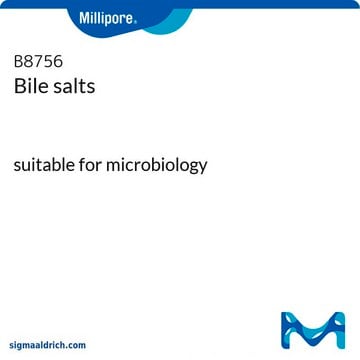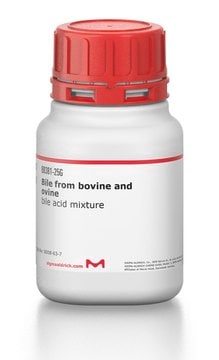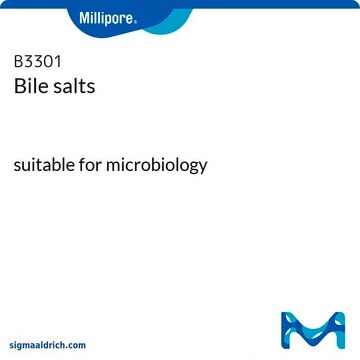B3426
Bile salts mixture
suitable for microbiology
Synonym(s):
Bile acids sodium salt, cholic acid-deoxycholic acid sodium salt mixture
About This Item
Recommended Products
sterility
non-sterile
Quality Level
form
powder
packaging
pkg of 100 g
loss
≤6% loss on drying
color
yellow to brownish-yellow
pH
7±0.5
solubility
distilled water: freely soluble
application(s)
microbiology
storage temp.
10-30°C
General description
Application
Preparation Note
Hazard Statements
Precautionary Statements
Hazard Classifications
Aquatic Chronic 3
Storage Class Code
11 - Combustible Solids
WGK
WGK 2
Flash Point(F)
Not applicable
Flash Point(C)
Not applicable
Choose from one of the most recent versions:
Already Own This Product?
Find documentation for the products that you have recently purchased in the Document Library.
Customers Also Viewed
Articles
Probiotics exhibit an inhibitory effect on pathogens, help prevent chronic intestinal inflammatory diseases or atopic syndromes, and support the immune system.
Probiotics exhibit an inhibitory effect on pathogens, help prevent chronic intestinal inflammatory diseases or atopic syndromes, and support the immune system.
Probiotics exhibit an inhibitory effect on pathogens, help prevent chronic intestinal inflammatory diseases or atopic syndromes, and support the immune system.
Probiotics exhibit an inhibitory effect on pathogens, help prevent chronic intestinal inflammatory diseases or atopic syndromes, and support the immune system.
Our team of scientists has experience in all areas of research including Life Science, Material Science, Chemical Synthesis, Chromatography, Analytical and many others.
Contact Technical Service














